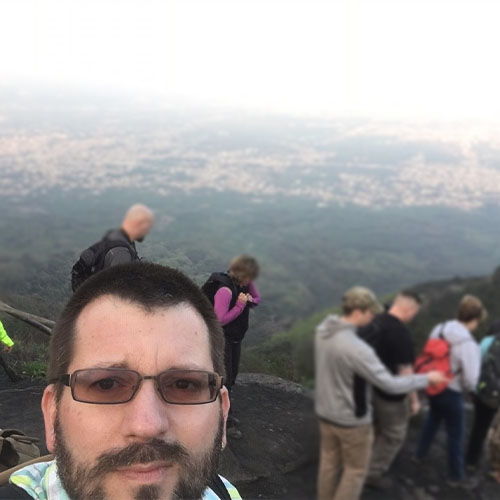Warrior Learns Coping Mechanisms with WWP Talk

Army veteran Steven Swiger wasn’t injured at war and always felt like Wounded Warrior Project® (WWP) resources shouldn’t be wasted on him. Rather, his injury happened during a training exercise for deployment when his head hit concrete after he was knocked off a tank. He sustained a severe concussion and fractured part of his spine.
But he didn’t reach out for help because if you were injured in the military, you were useless. A few weeks later, he began experiencing severe pain. Steven coped with severe headaches, memory loss, and losing consciousness while he walked around. He didn’t even remember his incident until he was asked about it. After a long journey of searching for effective medical treatment, which was quite an effort for someone who had never even taken an aspirin, he finally found the care he needed and was medically retired.
Although he eventually found helpful solutions for his injuries, he still found himself thinking, “Why did I ever choose to go into the military?” Steven felt useless. He missed being the one people relied on in the military. He knew the math formulas for everything — for example, he could easily calculate how much explosive would be needed for a bridge depending on its length, and he had many bridge lengths memorized.
“All I ever wanted was to serve my country,” Steven said.
He struggled with these feelings for years and yet again didn’t ask for help. “I didn’t take the step because I didn’t think I deserved it or really earned it.”
One day the pain became too much. He’d seen a billboard for WWP and decided to go to the office, explaining to the person who greeted him that he knew he wasn’t a “wounded warrior” but that he was really hurting and needed help. WWP connected Steven with WWP Talk.
WWP Talk is the organization’s mental health phone support line. The program provides a safe, non-judgmental outlet to warriors and their family members managing PTSD, anxiety, traumatic brain injury (TBI), and other invisible wounds of war.
“I don’t know if I would have made it without Julie,” Steven said. Julie was Steven’s WWP Talk specialist. “The call at the same time every week — at first it was kind of hard, but then I began to look forward to it. It was one of the few things in my life I could count on. Julie is a wonderful, caring person who made my life brighter.”
Program participants receive weekly calls from the same WWP teammate at the same pre-established day and time, with calls lasting about 20 minutes. The program duration is based on the needs of each person.
“During these phone calls, we work at the pace of each individual,” Julie said. “Everyone’s journey is different, and WWP Talk offers resources specific to what each person needs.”
Steven explained that WWP Talk gave him tasks each week to keep his brain busy. “The tasks were designed to help me figure out things that I didn’t even know I needed to figure out. And the regular communication made it easier to make, track progress on, and complete goals.
“I feel like I have coping mechanisms and tools to help me get through tough times now because of WWP Talk. I didn’t realize I’d begin to adapt, but I am. Wounded Warrior Project has been a game-changer.”
October is National Depression and Mental Health Screening Month. WWP offers mental health services for veterans and families coping with the invisible wounds of war. Get connected today or read more about how WWP helps.
About Wounded Warrior Project
Since 2003, Wounded Warrior Project® (WWP) has been meeting the growing needs of warriors, their families, and caregivers — helping them achieve their highest ambition. Learn more.